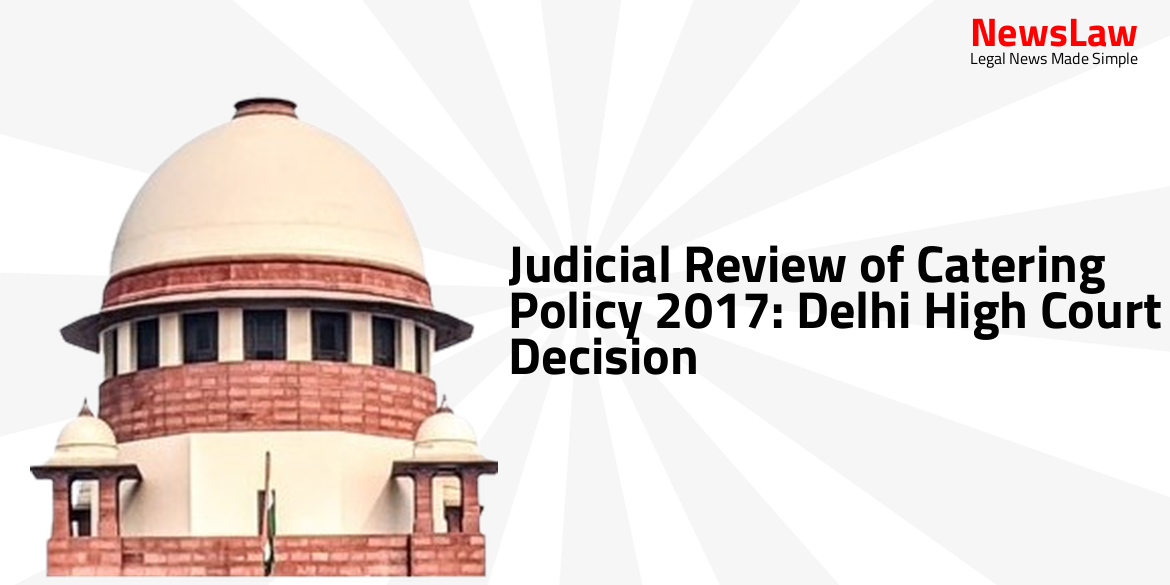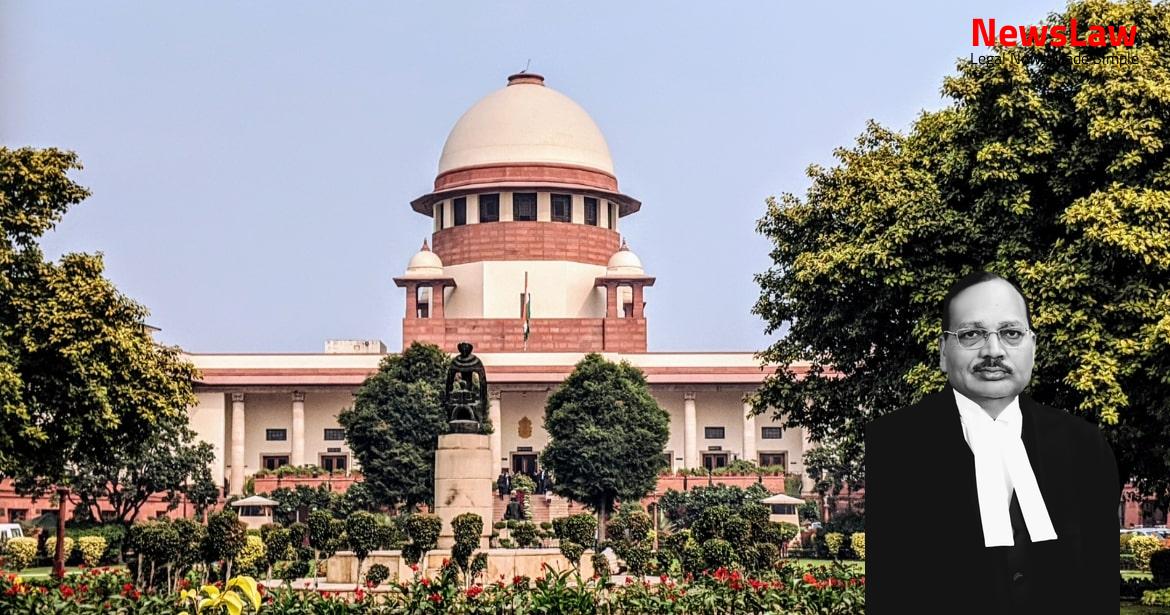In a significant legal case, the Delhi High Court recently addressed the judicial review of the Catering Policy 2017. The decision touches upon crucial aspects such as contractual rights, equitable estoppel, and the authority of the Railways to make policy decisions. This summary sheds light on the key highlights of the court’s ruling and its implications for policy frameworks and contractual agreements.
Arguments
- Petitioners cannot claim any benefit from a specific letter dated 21.05.2019.
- Submission relies on various case laws such as Dharam Singh v. Municipal Corpn. of Delhi, Central Inland Water Transport Corpn. v. Brojo Nath Ganguly, Delhi Transport Corpn. v. D.T.C. Mazdoor Congress, Shrilekha Vidyarthi (Kumari) v. State of U.P., and Sadhuram Bansal v. Pulin Behari Sarkar.
- A small part of the cause of action in Delhi does not solely determine jurisdiction for deciding the matter on its merits.
- Exclusive re-tendering for reserved categories and general categories in license agreements mentioned in Catering Policy 2017.
- Arbitration clause is incorporated in the license agreements and Catering Policy 2017.
- Allegations are made of arbitrary actions by the respondents violating Article 14 of the Constitution.
- Counsel for respondents argues that the petitions are maintainable, and the petitioners were fully aware of the terms, conditions, tenure, and renewal clauses during the bidding process.
- Petitioners are accused of seeking perpetual license extension after benefiting from Catering Policy 2017.
- Petitioners cannot have inconsistent positions as alleged by the respondents.
- Relevant case laws such as Senior Divisional Commercial Manager v. M. Mohamed Akbar and Rajasthan State Industrial Development & Investment Corpn. v. Diamond & Gem Development Corpn. Ltd. are cited to support these arguments.
- Vague claims of coercion and duress without specific instances are considered irrelevant.
- Discussion on the renewal and extension clauses of the Catering Policy 2017 is raised, emphasizing no renewal terms in the policy.
- Balancing right to livelihood and equal opportunity in Catering Policy 2017 is highlighted.
- Jurisdictional aspects are discussed based on the location of the Railway Board issuing the policy.
- Citing Kusum Ingots & Alloys Ltd. v. Union of India, Shiva Industries v. Union of India, and Durgapur Freight Terminal (P) Ltd. v. Union of India to support jurisdictional arguments.
- Violation of constitutional articles such as 38, 39, and 41 is alleged due to the policy clauses.
- Ensuring non-monopolization of licenses and providing livelihood opportunities to various individuals is argued to be a part of the Catering Policy 2017.
- Exclusive jurisdiction clauses in license agreements are highlighted, suggesting disputes should be resolved at specific zonal railway headquarters.
- Reference to the doctrine of forum conveniens is made to support approaching courts with the most proximate connection to the disputes.
- Mention of judgments like Jayaswals Neco Ltd. v. Union Of India, Malini Mukesh Vora v. Union of India, New India Assurance Co. Ltd. v. Union of India, Magma Fincorp Ltd. v. Orbit Motors Private Ltd., and KLG Systel Ltd. v. Operation Technology Inc.
- Clarifications on the letter dated 21.05.2019, limiting status quo/renewal to minor catering units allotted before Catering Policy 2017.
- The absence of a fundamental right to trade at specific public spaces is noted.
- Differential treatment of vendors/hawkers during the Covid-19 pandemic concerning license extensions is raised.
- Implications of Jayaswals Neco (supra) regarding demands raised by South East Central Railway and Indian Railway Commercial Manual are discussed.
- Arguments by counsel for petitioners on the violation of constitutional articles 14, 19(1)(g), and 21 due to Clause 11 of the Catering Policy 2017.
- References to legal cases like Olga Tellis v. Bombay Municipal Corpn., Consumer Education & Research Centre v. Union of India, South Central Railways (supra), and Vendors Cooperative Society v. Union Of India supporting petitioner’s claims.
- Accusations of license agreement execution under coercion, economic duress, and unequal bargaining terms between vendors/petitioners and railways are made.
Analysis
- The court considered the issue of territorial jurisdiction to entertain the writ petitions.
- The action/policy of the railways was deemed not violative of Article 14 of the Constitution.
- The licenses were rendered non-renewable as per the terms of the license and policy.
- Implementation of Force Majeure clause was advised for catering and vending contracts affected by the lockdown.
- The court emphasized that the petitioners cannot claim a vested right for perpetual renewal of the license.
- It was mentioned that the clause 11 of the Catering Policy 2017 explicitly stated no extension or renewal of Catering units.
- The court determined that the Railways have the authority to make policy decisions based on prevailing circumstances.
- Parties were advised to resolve disputes using clauses in the tender contracts.
- The petitioners’ demand for renewal of license was rejected, and they were advised to participate in fresh tenders if floated by the railways.
- The judicial jurisdiction to challenge Clause 11 of the Catering Policy 2017 was confirmed by the court.
- The petition challenges paragraph 1744 of the Indian Railways Commercial Manual as the root cause for the punitive demands raised.
- The challenge to paragraph 1744 is based on violation of Section 73 and 79 of the Railways Act, 1989.
- The existence of the challenge to paragraph 1744 is acknowledged without delving into its validity.
- The doctrine of estoppel by election is related to equitable estoppel and breach of fundamental rights is essential for a writ of Mandamus.
- Judicial review and mandamus for framing policy are distinct concepts.
- The doctrine of election is based on the principle of estoppel preventing contradictory actions.
- Petitioners cannot claim unequal bargaining positions as a defense when accepting contractual terms willingly.
- Contracts involve uncertain elements and do not guarantee profits, as seen in the case law discussed.
- The rights and liabilities of parties in contracts are governed by contract terms and applicable laws.
- Parties cannot play ‘fast and loose’ or ‘blow hot and cold’ in contractual matters.
- Participation in tenders is voluntary, leading to contract formation with mutual consent.
- Writs may be applicable in exceptional cases for enforcing equitable rights.
- Individual license agreement and Catering Policy 2017 contain arbitration clause for grievances or claims of damages.
- No merit found in the present petitions, thus dismissed.
- Petitioners granted 3 months to vacate catering units for transition to alternative vending.
- Vacating period starts from the extended license period or the date of judgment, whichever is later.
- Vacating is subject to payment of usual license fee.
Decision
- The present petitions are held to be maintainable.
- Renewal of License 14 is considered.
Case Title: MADAN PETHA STORE Vs. UNION OF INDIA & ORS. (2024:DHC:4476)
Case Number: W.P.(C)-5995/2024



